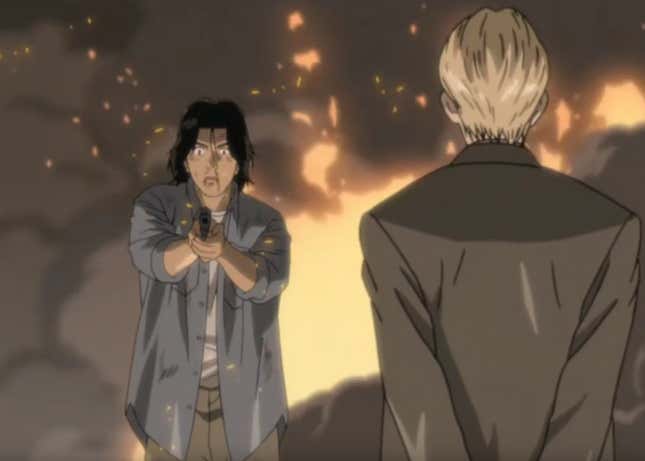
An anime series based on a manga of the same name by Naoki Urasawa, Monster is a work that constantly forces you to question your sense of morality and ethics. Good and evil become a bloody mess through the series and rarely gives your wounds the time to coagulate, instead, seeping blood until all the characters are soaked in their twisted ambivalence.
Fellow Kotaku writer, Narelle, recommended the 74-episode series and has written a brilliant essay describing why she enjoyed the series so much. Once I started, I couldn’t stop watching as it was so compelling.

Seeds of Time
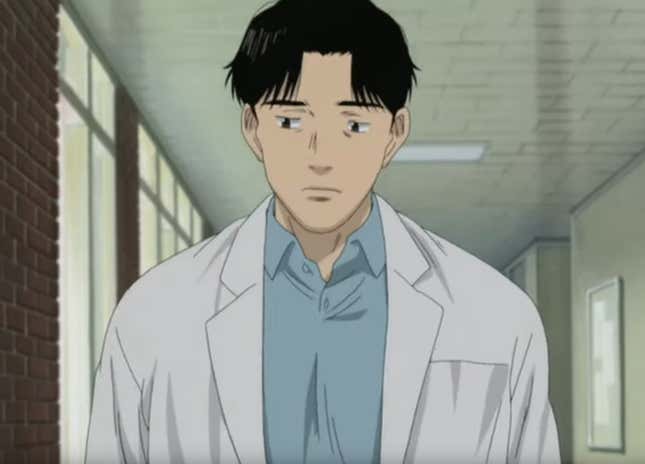
If there’s one cruel message Monster seems to hammer in, it’s that you never know what the ultimate repercussions of any act will be. Almost every time someone shows kindness or mercy, it’s thrown back at them with a vengeance, while on the inverse, evil acts can sometimes have positive effects. Monster centers around Dr. Kenzo Tenma, a Japanese brain surgeon who lives in Germany and has a bright future ahead of him. That is until he’s confronted with a dilemma; two patients come in to the hospital at the same time requiring surgery. One is the mayor and an important political figure; another is a young boy who’s been shot in the head and will die without surgery. The hospital director insists Dr. Tenma treat the mayor because his political support will be important for their future.
Tenma, wracked by guilt by an earlier choice to perform surgery on the more politically expedient patient, opts to save the young boy. Unfortunately, the mayor dies in the process. The director is furious with Tenma and decides to crush his career. Tenma’s fiance Eva, who’s also the daughter of the director, dumps him. Feeling like his whole life is falling apart, Tenma gets drunk. Unable to control his emotions, he winds up by the bedside of the boy he saved and curses the director, wishing him and his colleagues were dead.
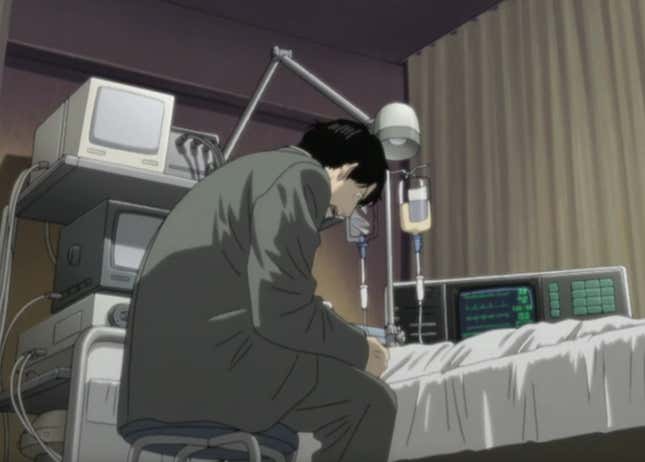
Unbeknownst to him, Johan is awake, listening attentively. Tenma has a signed a pact with the devil without even knowing it as Johan is a serial killer and the eponymous “Monster.” When the director ends up murdered, Tenma has no idea why it happened. He ends up taking the director’s place, where he stays for nine years. During that time, he saves many lives. This forces us to consider that if Johan hadn’t killed the director, then Tenma most likely would have had his career as a surgeon destroyed. In that sense, were the ultimate results of Johan’s actions actually beneficial?
In a harrowing moment, Tenma learns the truth behind the director’s death and Johan’s connection to it. He can’t live with the burden of that guilt and newly dedicates his life to killing Johan as atonement. In the process, he is blamed for the murders Johan does and has to go on the run from the law. What follows is a grueling and painful exploration of post-WWII/Cold War Germany, involving Nazis, East German and Czech secret police, and so much more of that murky past as Tenma tracks Johan down.
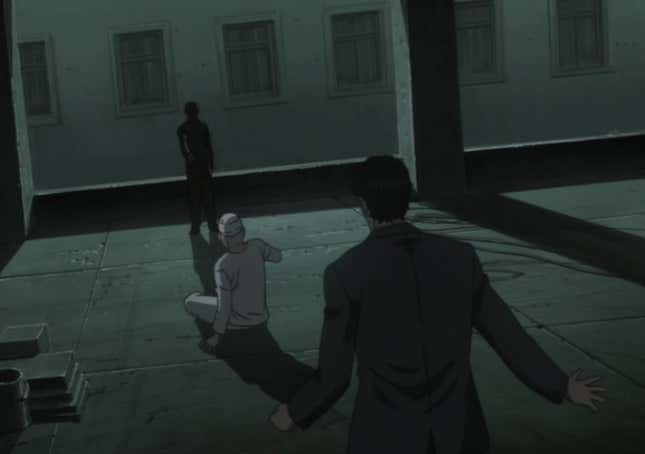
Tenma’s abilities as a surgeon are unparalleled and almost super-hero like in the series. With only a few exceptions, he saves everyone he operates on. He’s spurred on in part by the attempt to refute the words of his ex-fiance who nonchalantly declared, “People’s lives aren’t equal.” For him to make the decision to end a life is the ultimate betrayal of his whole way of life.
In some ways, the dilemma Tenma faces reverses the one of Batman in Dark Knight. Whereas Batman struggles never to break his one rule of not killing anyone, Dr. Tenma actively seeks to break his rule as a doctor of preserving life so he can kill Johan.
Our Destination Calls
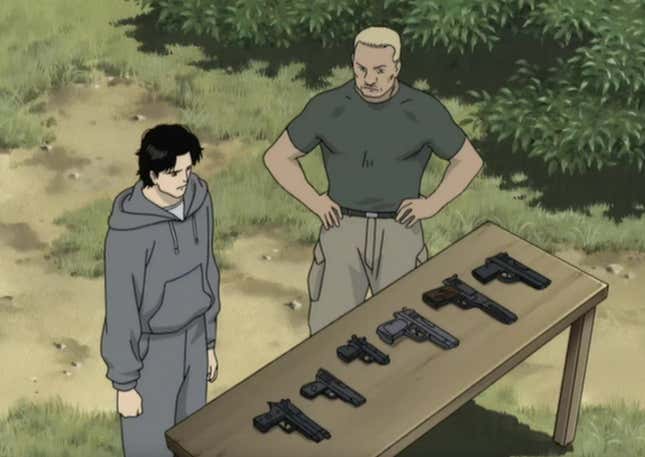
In one of my favorite episodes, Tenma actually takes the time to undergo training with a former army veteran, Hugo Bernhardt, so he can learn how to kill. It adds an element of realism to explain how a doctor, who has no experience with firearms, learns how to use them. During the episode, we learn about Bernhardt’s dark past and the war crimes he committed when he served in Myanmar. His actions then haunt him to this day. But we also see how Tenma, despite being on a mission to kill, helps Bernhardt to take steps to make peace with that past.
I actually loved the episodes where the Tenma’s simple acts of kindness and humanity help heal people rather than his miraculous surgical ability. While most of the episodes are from the perspective of the doctor, some of them are from different characters with Tenma passing through their lives.
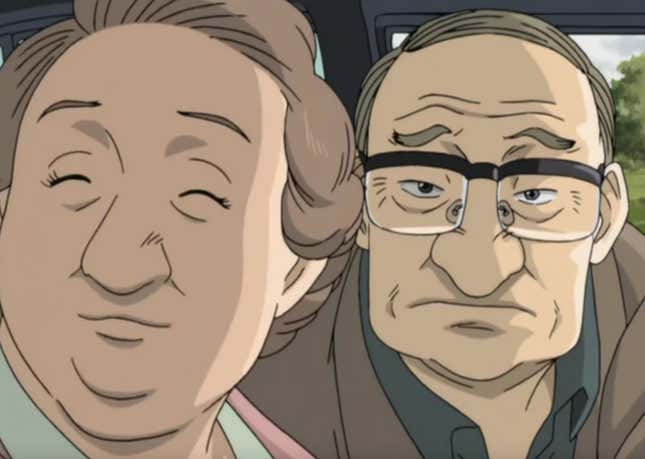
In the 20th episode, “Journey to Freiham,” Tenma hitches a ride with an elderly couple who has traveled to Germany from the UK. Unfortunately for them, their car runs out of gas. Tenma hitchhikes with another driver, but promises to come back with gasoline. The couple wonders if Tenma will return as he could have easily ditched them and gone on. But many hours later, Tenma comes back lugging extra fuel. As they drive together, the older male reveals he used to be a police officer. His special trait was that he could tell the truth about a suspect’s guilt just by looking at them. They spend their time visiting some of the sites their son used to write them about, which initially made me wonder if their son was dead. The truth was very harsh. “It was unbelievable to think that Robert had committed murder,” the father admits. “But he did. And the fact that I couldn’t sense what was going on with my own son made me realize it was time for me to turn in my badge.” The whole point of the trip was to visit their son in a German prison. In a bit of a twist, the old man recognized Tenma on the wanted posters. At the same time, he believes Tenma is innocent and lets him go. It’s a bittersweet conclusion, knowing what awaits the elderly couple as they arrive at the prison.
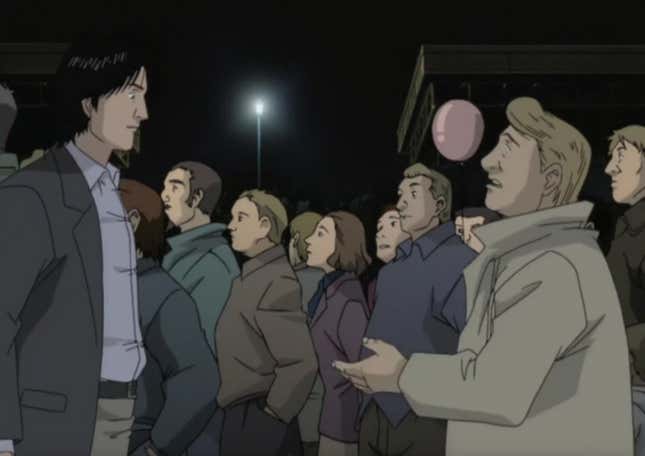
Probably one of the episodes I remember most is “The Monster’s Abyss” which revolves around criminal psychoanalyst, Dr. Gillen. Dr. Gillen went to medical school with Dr. Tenma, but feels a strong rivalry with Tenma. This is because Gillen is convinced Tenma looks down on him after he caught him cheating on his medical law exam. That past transgression has haunted Gillen and has been a chip on his shoulder for much of his life. Fueled by his insecurities, Gillen agrees to help the police capture Tenma. But by the end of the episode, he realizes Tenma is innocent and helps him escape. Tenma is grateful and tells Gillen that he never looked down on Tenma, actually respecting him. Dr. Gillen angrily confronts him with his moment of shame: “But I know you caught me cheating on that medical law exam. There’s no doubt about it! I saw you looking directly at me and my cheat sheet.” Dr. Tenma looks back at him, momentarily confused, before breaking into a smile. “Well yeah, I cheated on the medical law exam too.” It was all in Gillen’s head, even though it had gnawed at him since medical school. His shame had almost led him to betray Tenma, when in fact, Tenma had no such feeling. It was a brilliant exchange that said so much about human nature and how miscommunication leads to so many self-inflicted and unnecessary wounds.
Close Your Eyes
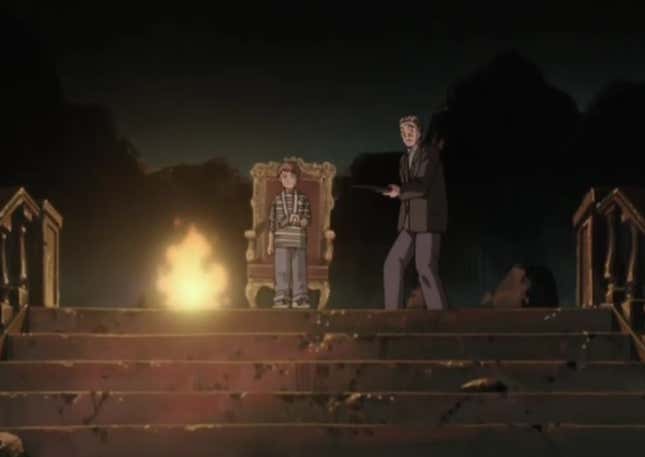
The tragedies of human nature are epitomized in Johan’s connection with a terrible program called the 511 Kinderheim. Run by the East Germans, it was a laboratory where they carried out social experiments on orphans to try and create perfect soldiers. To that end, they performed horrifying acts on the children to desensitize them. The orphans weren’t even given names so they could be under the complete control of their instructors. Some of Monster’s most difficult moments are when they expose the crimes many of the adults committed against children. Contemporary Johan teaches some kids a game of dare that represents how he views his past. Children are required to climb on a roof and walk towards each other with their eyes closed. “It’s like making a wager with fate,” one of the kids explains.
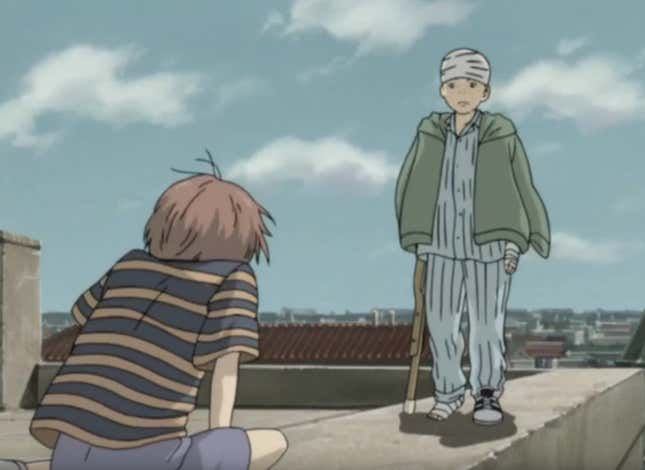
The more Dr. Tenma learns about the past, the more he comes to understand the circumstances around Johan’s life. Throughout the journey, there’s so much evil everywhere he turns, it’s hard not to feel despair and hopelessness. Through it all, Tenma’s faith is continually tested. One character in particular, an assassin named Roberto, earned my undying hatred. He is one of the most despicable and ruthless characters ever portrayed in an anime series. Add in a group of white supremacists who believe Johan is the new Fuhrer and Monster wraps its way around your brain, squeezing to the breaking point, then leaving you wondering if humanity has a future.
The long series culminates in a climactic decision. Johan wreaks havoc on an unsuspecting village, Ruhenheim, carrying out a campaign of pogrom that causes the villagers to murder each other. Dr. Tenma finally catches up with him and faces him in the pouring rain.
“The only thing everyone is equal in is death,” Johan says, a play on Eva’s words that motivated much of the journey.
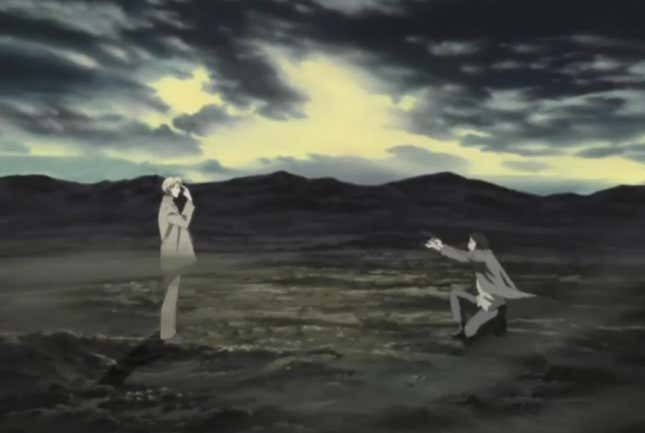
Tenma points the gun at Johan and the colors have all become muted, drowning in darkness. Johan welcomes death, even pointing his finger at his forehead exactly where he was shot before the surgeon had saved him. Tenma hesitates, shaking, wanting to shoot, but unable. Johan, seeing Tenma’s resolve wavering, points his gun at a kid he’s taken captive. He wants death.
A gunshot rings out. Tenma has made the ultimate sacrifice. In the process of hunting a monster, he’s finally become a monster himself and ended Johan’s life. Tenma might as well have been shooting himself, but he deemed it necessary to save additional lives.
Or at least that’s what I thought.
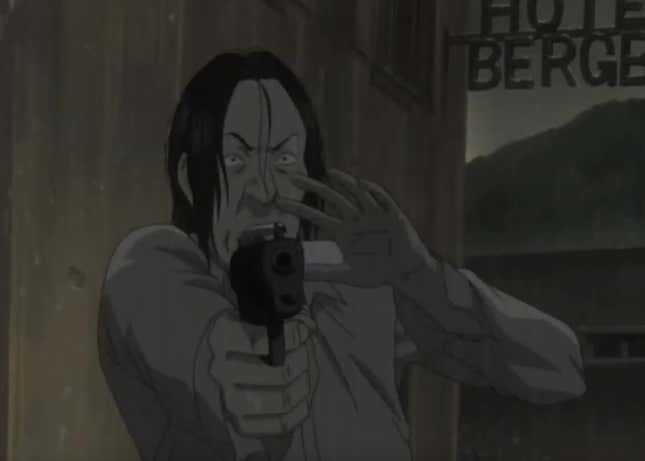
It turns out one of the villagers suffering delusions mistook Johan for a beast and shot him in the head as the boy Johan had taken hostage was his son.
I’ve read lots of speculations on Monster’s ending. Honestly, the first time through, I felt the ending cheated viewers by not giving Tenma the final choice. I’m not against a random person shooting Johan. But I felt it should have come only after Tenma had made his ultimate decision. If Tenma actually lowered his gun, unable to shoot despite knowing Johan would kill the boy next to him, it would have been a choice. Instead, it’s taken out of both their hands.
Contrast this with the end of Dark Knight. Batman is given the choice between killing Joker or saving him. He saves the Joker, proving that despite everything that’s happened, he’s remained true to his code.
To deny Tenma that choice made me upset. I’d watched over 70 episodes to see what Tenma would do. Even when Johan needs a surgeon to operate for the gunshot, it felt anticlimactic. Dr. Tenma’s choice to carry out the operation is a repeat of the beginning of the series and doesn’t have the same gravity because Tenma never made the decision to kill him or not. Of course, he could refuse, and even that would have been an interesting choice. But Tenma saves Johan’s life. The denouement had ended with a whimper.
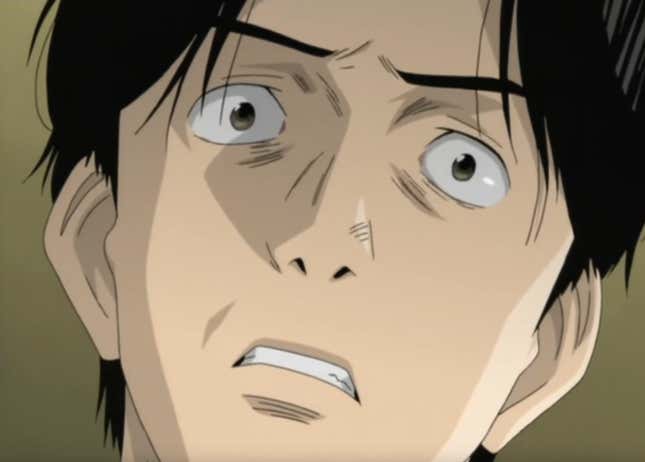
Something about that scene bothered me. Why had Urasawa made this choice as a creator? It definitely upended expectations. But it also emphasized the inherent savagery of the world they inhabited. That made me think again about the game of dare Johan had taught the children. Had he been playing the same game with Dr. Tenma? They’re both on the precipice and one small mistake will lead either of them to their fall. Fate takes over, but it never would have gotten to that point if Dr. Tenma hadn’t unwaveringly met him on the building’s edge. The question that Monster is provocatively challenging us with is whether agency and free will even plays a role in our lives, or if it’s purely in the hands of chance and fate. Dr. Tenma’s attempt at the beginning of the series to change fate by saving Johan’s life is what led to so much destruction and pain. Johan is reacting to the whims of fate in the only way he knows how, just as Tenma does. This is further emphasized by a confession Johan makes about the relationship between his mother, his sister, and himself.
There are lots of questions about what ultimately happened to Johan in the final episode after Dr. Tenma treated him. There are suggestions that Johan actually died in surgery and that Tenma just imagines his presence, while others say Johan escaped and went to start a new life.
But the only question I keep on asking myself is, who’s the real monster?